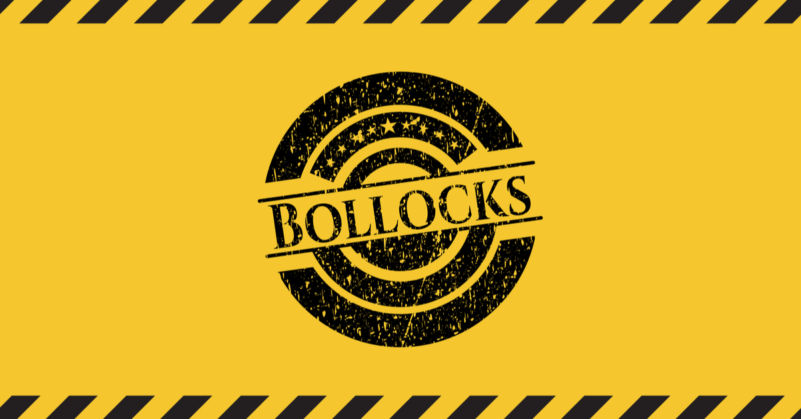‘Integrity. Excellence. Teamwork. Quality’… recognise any of these? Loads of businesses use them to describe their company values. And they smack of corporate hot air and waffle. No wonder people get cynical and doubtful when they think of company values. If they use words like this, they’re meaningless. What’s the point of having them if they’re the same as everyone else’s?
When I see words like ‘integrity’ written on company websites and handbooks, it makes me shudder. Even well-intentioned people that I’ve worked with have core values that are total bollox. I think they get them confused with branding or company positioning statements. But they’re not that at all.
Core values should be the definition of your company’s culture. Simple as that. They’re a shorthand way of capturing behaviours that you see as crucial in your business. Behaviours that will enable you to execute your strategy. And your values should be unique to you. Otherwise, they’re not worth the paper they’re written on.
Why have core values?
Take it right back to the beginning. What are you trying to do here? You’re trying to grow your business. Your strategy is entirely focused on achieving this goal. You’ve worked out your core customer and the problem of theirs that you’re going to solve better (and more profitably) than anyone else. But you need a culture that will execute this strategy.
In his best-selling book ‘Good to Great’, Jim Collins compared good companies and companies that were great, trying to identify the differences. The great ones had strong, solid cultures. And by coming up with your unique set of values, you’re trying to codify this culture. You’re getting to the heart of the behaviours of your best staff. By spending time on getting this right, you and your team will know what’s expected of them every day.
Once you’ve codified your culture with a clear and unique set of values, you can drive social currency towards the people who exhibit them every day. The aim is to get everyone to live and breathe them so give praise and reward through a values lens. Celebrate when people have been total rockstars and build stories and rituals around them. Use them for recruitment. Because you’re clear on what it means to embody your values, your hiring teams will have a clear set of behavioural guidelines to look for. Specific questions can be asked at interviews to filter out people who wouldn’t behave in the right way once you get them in your organisation.
Spotting when values mean something and when they don’t

When I was MD of Rackspace, we were determined to buck the trend and develop some decent core values that meant something. I got the whole team together and asked them to tell me the behaviours we valued. We came up with 15 traits that we wanted to encourage, and from this, whittled them down to a set of five company values:
- Fanatical Support in all that we do
- Treating Rackers like friends and family
- Passion for our work
- Results first – substance over flash
- Keep our promises (Bad news first, no surprises)
These values guided everything – not just our relations with our customers but how we dealt with each other, day in, day out. They gave us a sense of personal pride and a strong identity.
And now? Well, Rackspace has grown and changed into a very different beast from the one I joined. And their values have changed too. They still have five, but that’s where the similarity ends. Now, they read like every other IT services company.
- Excellence
- Customer-driven
- Expertise
- Agility
- Compassion
Yawn! How things have changed.
Focus values on behaviours
‘Excellence’ and ‘integrity’ are poor words to use because they’re not specific behaviours. They’re far too broad and too obvious. Work out what it is you want your staff to do. Then find a word that fits that.
In the earlier days of Rackspace, we even spelt out this behaviour in the fifth value around keeping our promises. It was ‘bad news first, no surprises’. If we cocked something up, we wouldn’t wait to be found out by our customers. We’d ring them proactively and tell them we’d made a mistake. This linked back to our purpose of Fanatical Support and our BHAG of being ‘the Ritz Carlton of IT Service providers’.
So the value and behaviour we expected in our staff had a direct line of sight to our strategy. It meant that when we hired new employees, we asked them, ‘Give me an example of when you made a mistake in the past. What did you do?’ We were looking for people that reacted quickly and honestly.
Don’t fear mistakes – learn from them
I have two young daughters aged 7 and 5. If the playroom’s a tip and I ask them, ‘Who did this?’, they both look at me with huge eyes and shrug their shoulders. Either one of them is lying or we’ve been burgled! And there are striking similarities with most companies. It’s normal to sweep things under the carpet and try not to get caught out. Maybe because there’s a mistaken belief that being found to be wanting would undermine their client’s trust in them. The opposite is true.
If you’re a fast-growing business in a service industry, you need to have staff that admit when they’ve made a mistake. And quickly. Your whole culture needs to reflect that. To change anything in your business, you need to identify errors without any delay and act on them to make a correction. If you have a philosophy that denies anything’s broken, your business will be in aspic.
Hire, fire, recruit and praise using your values
Every quarter, look back with your Executive Team and ask yourselves these questions: Have we promoted anyone as a result of our values? Have we fired anyone because they were out of profile with our values?
When we were still small at Rackspace, we scored everyone against our values every quarter. The person with the highest score was then a de facto employee of the quarter and I’d speak directly to any staff with low scores. I remember vividly one guy, David, who scored at the very bottom one particular quarter. The feedback I gave him was, ‘Sorry you’re at the bottom because you didn’t pick the phone up quickly enough and that’s annoying everyone on your team.’ Next quarter, bang! He came first, winning employee of the quarter. He’d been given simple, direct feedback that he acted on straight away.
Whenever you see someone displaying a behaviour linked with your values, single them out. At Rackspace, if we saw someone doing the right thing, we’d say thanks and write it on a post-it note that we stuck on the wall, right next to the value they’d embodied (see above). This links back to question 4 of the Gallup Q12 measure of staff engagement – ‘In the last week, have you received recognition or praise for doing good work?’ You want all your staff to score this at a level 5. It’s how you reinforce your values and get them working in your organisation, strengthening your culture every day.
And if you look back and find that certain values aren’t being used in this way, then scratch them out. Maybe they sounded good at the time but they’re not useful.
Make your values memorable
Your values should be pithy, short statements that are easily memorised. Sometimes a single word can be used as a shorthand. You might have three to five values and then two to three behaviours that link to each one. And it helps to have some stories about what each one means.
Stories and legends can strengthen bonds, motivate and engage staff like nothing else. They will educate and guide your staff, modelling the types of behaviour you want to see everyone display. At Peer 1, we had several people who stood out for their incredible work ethic. They’d win employee of the month, quarter and year for outstanding contribution.
One guy, Larry, was working on a project for our client, the British Red Cross. They were in the process of moving from one data centre to another. A massive typhoon hit Indonesia and they immediately launched an appeal. The next day was set to be the busiest for donations so a planned software change needed to be moved to 3 am to cause minimum disruption. The software vendor refused to do this, saying they only worked 9 to 5. But Larry valiantly came to the rescue, saying ‘Teach me how to do it and I’ll make it happen.’ Sure enough, he got up at 3 am and sorted the issue. Amazing dedication with a direct impact on people in desperate need.
Tell these stories frequently to existing and new staff. And when someone transgresses your cultural code, make sure you talk about this too. Use this as a learning experience, telling everyone why they are no longer working for you.
Allow your values to evolve
Don’t go through a values exercise once and then shelve them, believing you’ve ‘done’ your values. They should evolve and change as your company culture does the same. A bit like legal precedents. Parliament will write law but, over time, judges will interpret it and precedents will be set.
Review your values regularly and fine-tune them as you go. At all times, look for authenticity. And remember, if someone outside your organisation looked at them and didn’t immediately know it was you, your values are probably bollox!
Written by business coach and leadership coaching expert Dominic Monkhouse. Contact him to schedule a call here. You can order your free copy of his book, Mind Your F**king Business here.

